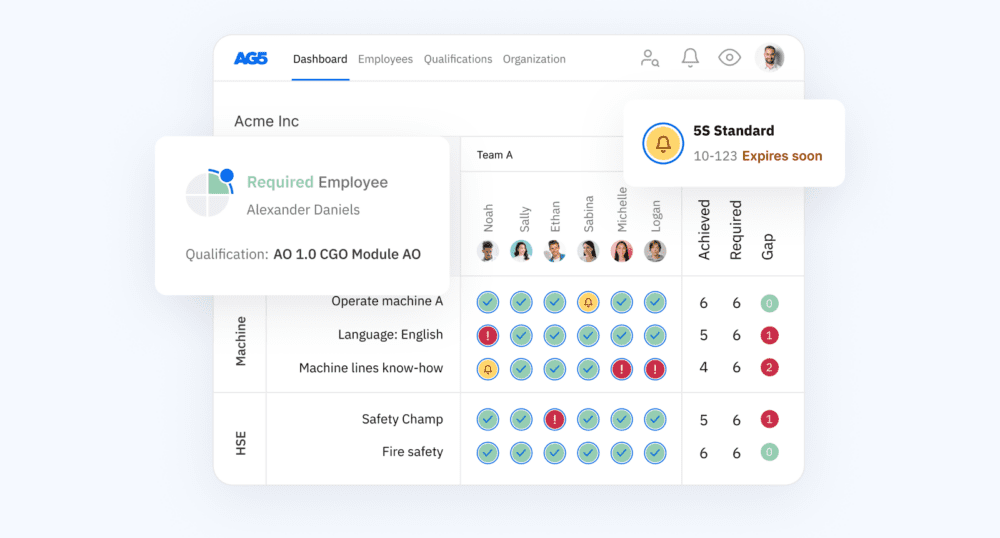What is skills tracking? Benefits & how to get started
In this article, we’ll take a look at the definition of skills tracking, its benefits, and practical tips on how to get started.
Effective skills tracking can help your organization, teams, and employees improve on a number of metrics, including productivity, efficiency, safety, and performance.
In this article, we’ll take a look at the definition of skills tracking, its importance and benefits, and how AG5 can help you track the skills of your employees across the entire organization.
What is skills tracking?Copied
Skills tracking is the process of monitoring and managing your employees’ skills. You can track skills on an individual level, or by team or department.
By adopting and implementing an effective skills tracking strategy, you can develop clear oversight of the skills your employees have and those they need.
In turn, you can develop:
- Targeted training or upskilling programs
- Recruitment initiatives
- Succession plans
This will ensure your organization stays productive, safe, and compliant with regulatory standards.
Five benefits of skills trackingCopied
Let’s take a brief look at five of the fundamental benefits of skills tracking. These are by no means the only benefits of skills tracking, but they are among the most important – and are also those that our clients report enjoying after implementing a skills tracking strategy with the help of AG5.
1. Improved workplace culture (and reduced staff turnover)
Placing the spotlight on your employees’ skill development will boost company culture and employee loyalty [1]. You will create leaner and more agile teams that are in charge of their own personal development, improving both engagement and job satisfaction – two large factors in reducing employee turnover [2]
2. Boosted productivity
By eliminating skills gaps with your skills tracking strategy, you will ensure that your employees and teams always have the necessarily qualifications or certifications to keep operations running. This will help you avoid costly downtime or delays – and keep productivity to a maximum.
3. A competitive edge
A productive organization is a competitive organization. By continually optimizing your workforce – and in turn, your production processes – your organization will become more flexible, adaptable, and competitive.
4. Industry 4:0 preparation
With Industry 4.0, our equipment and processes become smarter, we must evolve alongside them. This means learning or earning new skills, qualifications, and certifications that arise with the emergence of new jobs and roles. [3]
5. Contingency planning
With clear oversight over the skills, qualifications, and certifications that are necessary to keep operations running, you can better prepare for the unplanned – whether it’s new technologies, market shifts, or valuable employees out sick or leaving the organization. By tracking skills, you’ll stay flexible and agile – ensuring you can adapt to any situation.
![]()
How to track employee skills: Getting started with skills trackingCopied
To track your employees’ skills, you will need to implement your skill tracking strategy. Here’s a quick step-by-step guide you can follow to develop and implement such a strategy.
Step #1 – Make an inventory
Make an inventory of the core skills your organization needs, then determine whether your employees already possess them. [4] To do so, you can ask yourself these questions:
- Which skills, competences, and qualifications do your employees have already and/or need in the future?
- Do any skills gaps exist? Are any emerging? If so, how can you close them as quickly and efficiently as possible?
- How can you paint a clear picture of your employees’ skills and competences for both internal and external use?
Step #2 – Create a clear overview
Group the skills, competences, and qualifications required for each of your job titles or roles. This allows you to:
- See at a glance who is capable of performing a given task or fulfilling a certain role.
- Spot those employees who are versatile and flexible, or who can potentially fill multiple roles
- Identify roles that require highly specialized skill sets (as well as the employees who possess them)
Step #3 – Generate a skills matrix
Skills matrices are the perfect tool for visualizing your employees’ skills, competencies, knowledge, and qualifications. If you don’t want to create your own, you can download one of AG5’s free, Excel-based skills matrix templates.
Alternatively, you can read our article, “Everything you need to know about skills matrices,” for a step-by-step guide to creating one of your own.
Step #4 – Update and evaluate
Skills tracking – just like your employees’ professional development – is a continuous, never-ending process. With this in mind, you’ll need to regularly update your skills matrices to ensure they are current and accurately reflect the new skills, qualifications, and certifications your employees have and need.
How to track soft skills vs. hard skillsCopied
Hard and soft skills require slight adjustments to your tracking methods – especially when taking a skills inventory – as they both exhibit distinct characteristics and contribute to success in different ways.5
Tracking methods for soft skills
Soft skills focus more on interpersonal qualities than technical ability. This means you’ll need a human-centric approach to tracking them. You can use the following methods to track soft skills:
- Self-assessments. Use questionnaires or surveys to allow employees to reflect on their soft skills, especially in areas such as communication effectiveness, teamwork, and emotional intelligence
- Collecting feedback. Gather feedback from peers, supervisors, direct reports, and other stakeholders.
- Behavioral interviews. During interviews or evaluations, focus on scenarios that require soft skills. Ask for examples of how the employee handled conflicts, collaborated with teams, or demonstrated leadership
- Observation and coaching. Observe employees in real work situations, then offer feedback and advice on areas for improvement.
Tracking methods for hard skills
Hard skills are quantifiable, and can therefore more clearly measured. You can use the following methods to track hard skills:
- Certifications and qualifications. Track employees’ progress in courses, workshops, or certification programs related to their hard skills.
- Skill assessments. Use standardized tests or assessments to measure proficiency in hard skills.
- Performance metrics. Tie hard skills to role-specific key performance indicators (KPIs).
- On-the-Job evaluations. Assess how well employees apply their hard skills in their day-to-day routines. Here, you can review completed projects, output quality, or adherence to industry standards.
Is there any skills tracking software available?Copied
There are many types of skills tracking software. If you are currently using a Learning Management Software (LMS), for example, it’s likely that you are already tracking skills to some extent.
However, not all software will consolidate all your data into a centralized location; it’s not uncommon for an LMS provider to only track the skills developments from the courses and modules that they offer. In such cases, skills gaps can still occur.
If tracking your employees’ skills, certificates and qualifications is mandatory for business continuity in your organization, you might need dedicated skills tracking software.
Develop a clear overview of your employees’ skills with AG5 skills management softwareCopied
AG5’s skills management software allows you to track progress related to your employees’ skills, certifications, and qualifications, regardless of where it was earned or maintained.
You’ll have a clear overview of this – and much more – from a centralized hub, where you can consolidate all of your employees’ skills data in one place. Want to see it in action?
Request a free, live, 15-minute demo for a customized look at how AG5 would work in your organization.

Sources Copied
- Change view: Table
-
APA
| # | Source title | Description | Publication | Retrieved | Source URL |
|---|---|---|---|---|---|
| 1 | The skills-based organization: A new operating model for work and the workforce | Deloitte | - | April 18, 2024 | https://www2.deloitte.com/us/e.. |
| 2 | State of the Global Workplace: 2023 Report. | Gallup | - | April 13, 2024 | https://www.gallup.com/workpla.. |
| 3 | What are Industry 4.0, the Fourth Industrial Revolution, and 4IR? | McKinsey | - | July 11, 2024 | https://www.mckinsey.com/featu.. |
| 4 | Hard Skills vs. Soft Skills: What's the Difference? | Indeed | - | April 17, 2024 | https://www.indeed.com/career-.. |
Author Copied
Revisions Copied
Added sections, refreshed content, added sources.
Written by: Rick van Echtelt
Copy edited by: Adam Kohut

